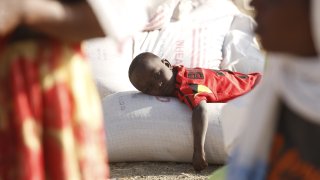
The United States has begun restricting visas for government and military officials of Ethiopia and Eritrea seen as undermining efforts to resolve the deadly fighting in Ethiopia's Tigray region, saying it is time for the international community to take action in a conflict that has sparked allegations of ethnic cleansing and fears of famine.
The Ethiopian government called the action “misguided” and “regrettable” in a response issued Monday.
“The Ethiopian government will not be deterred by this unfortunate decision of the U.S. administration," said the statement tweetedby the ministry of foreign affairs.
Get a weekly recap of the latest San Francisco Bay Area housing news. Sign up for NBC Bay Area’s Housing Deconstructed newsletter.
“If such a resolve to meddle in our internal affairs and undermining the century-old bilateral ties continues unabated, the government of the Federal Democratic Republic of Ethiopia will be forced to reassess its relations with the United States, which might have implications beyond our bilateral relationship,” said the statement.
Thousands of people are estimated to have died in the six months the conflict between Ethiopian troops and the Tigray People's Liberation Front has raged in the northern regional state. Atrocities including rape, extrajudicial killings and forced evictions have been part of the violence, local authorities and aid groups have alleged.
“Despite significant diplomatic engagement, the parties to the conflict in Tigray have taken no meaningful steps to end hostilities or pursue a peaceful resolution of the political crisis,” U.S. Secretary of State Antony Blinken said in a statement Sunday night.
U.S. & World
“Without an immediate cessation of hostilities and a rapid expansion of humanitarian access, current and significant food insecurity could lead to famine,” Blinken said.
The crisis began in November after Ethiopia accused former leaders of the Tigray People's Liberation Front, or TPLF, of ordering an attack on an Ethiopian army base in the region. Troops sent by Ethiopia’s leader, Prime Minister Abiy Ahmed, quickly ousted the TPLF from major cities and towns, but guerrilla fighting was still reported across the Tigray region. Troops from neighboring Eritrea joined in support of Ethiopian forces.
In the U.S., the Senate last week passed a resolution condemning “all violence against civilians” in Tigray and calling for the withdrawal of troops from Eritrea. Blinken has alleged that ethnic cleansing was taking place in the western Tigray area.
Besides the visa restrictions, Blinken said Sunday night the U.S. was imposing wide-ranging restrictions on economic and security assistance to Ethiopia and would bring U.S. defense trade control policy in line with the restrictions.
The U.S. will continue humanitarian assistance and certain other critical aid to Ethiopia in areas such as health, food security, basic education, support for women and girls, human rights and democracy, good governance and conflict mitigation, Blinken said. At the same time, the U.S. will continue broad restrictions on assistance to Eritrea, he said.
Citing provisions in the U.S. Immigration and Nationality Act, Blinken said the visa restrictions would affect issuance of visas for any current or former Ethiopian or Eritrean government officials, members of the security forces or other individuals responsible for, or complicit in, undermining the resolution of the crisis.
Amhara regional and irregular forces and members of the TPLF were included, Blinken said. Also included were people who have conducted wrongful violence or other abuses against people in the region, as well as those who have hindered access of humanitarian assistance to those in the region. Immediate family members of such persons may also be subject to the restrictions, he said.
“The United States has deepening concerns about the ongoing crisis in Ethiopia’s Tigray region as well as other threats to the sovereignty, national unity and territorial integrity of Ethiopia,” Blinken said in the statement.
“People in Tigray continue to suffer human rights violations, abuses and atrocities, and urgently needed humanitarian relief is being blocked by the Ethiopian and Eritrean militaries as well as other armed actors,” he said.
The U.S. called on the Ethiopian government to meet public commitments to hold accountable all those responsible for human rights violations and abuses, to protect civilians, and to ensure unhindered humanitarian access, Blinken said.
“The United States reiterates its calls for a durable, political solution to the crisis,” he said.



